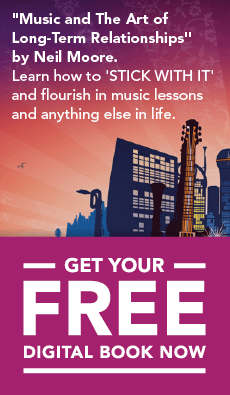We’re excited to launch the Creative Coaching Series, programs designed for both students and teachers to deepen and broaden the music learning experience. The first title, from our Director of Programs Gordon Harvey, looks at the sometimes scary prospect of performing for others.
In this post Gordon distills some of the key topics in his program into some useful tips for those who would like to share their music, whether to a wider audience or just family and friends.
“Can you play us something?”
Have you ever found yourself dreading someone asking that question? Have you ever had guests at your home and hoped your music doesn’t come up in the conversation? I mean, you know they’re going to ask.
Truth be told, if you only ever play for your own pleasure and never for anybody else, that’s completely wonderful. But a pleasure shared is a pleasure doubled, and I think it would be sad to never experience the joy of giving others the gift of music. Whatever it is that you play, whether it’s at a simple or an advanced level, whether it’s your own music or your interpretation of somebody else’s, whether you share it with your closest friends or the whole world, it’s a little part of you and it has value.
Performing doesn’t have to be the big deal you may imagine. However big or small the stage you choose, the advice is basically the same. It’s not about eliminating fear, it’s about harnessing and directing your energy in service of the music. Try these simple snippets of advice:
It’s Normal to be Nervous
You might be surprised to know that some of the most famous performers have been tormented by stage fright. From Chopin through Pavarotti to Barbra Streisand, it’s plagued performers since the first stage was constructed. For some, the issue eases over time; for others, it’s their companion forever. And yet they keep getting up there. As Per Bristow elegantly puts it: that’s not confidence – it’s courage. The first thing is to accept your nervousness and choose to carry on anyway. Commonly, the symptoms ease just through that simple acknowledgement.
… focus on the music, and let it work its magic. You are just the delivery system. The music is the living thing you are delivering.
Find Your Flow
Psychologists refer to a state of mind called “flow”. You might know it as getting “in the zone”. It’s about finding a level of challenge that has you able to focus effectively: too challenging and you become anxious and lose concentration; not challenging enough and you get bored and lose interest. You’ve probably been in flow sometimes while your practice is going well – you feel in control and the music feels good. That’s one of the great things about music – when it feels and sounds good it has its own momentum and generates a sense of pleasure and reward. So the music itself contributes to a feedback loop that enhances the flow state.
Always remember that your performance is about the music first and foremost. Keeping your attention on the music rather than on you will help keep you in the flow channel.
Preparation
The other factor in the Flow equation is skill level. The challenge must be matched by your ability to actually do the job. For your performance, the obvious mission is to prepare well. Give yourself plenty of time. Because a performance situation naturally raises the challenge level, choose a piece that’s well within your skill level. It’s way better to play a simple piece really well than to clumsily try to show off how advanced you are.
Then: prepare your piece thoroughly. This is a whole subject worth a separate discussion, but one thing is for sure: preparation is not about just practicing. Simple repetition is not enough, especially if you’re doing it mindlessly. Flow itself is a learned skill that you can consciously develop. So work on the piece in ways that raise the challenge level and keep you in the flow channel.
If I could suggest one specific preparation skill it would be this: Listen. Really listen to how you play. Record yourself and listen back, noting everything you can think of about how you play and how the music makes you feel. Find ways of playing that sound good to your ears.

Flow in your Performance
The flow state you experience at home may not be the same as the flow state at your actual performance. At the performance, you will be in a different head space. Your adrenaline level will be raised. The “performance energy” required will be a little different. You need to find that appropriate energy level.
I recommend you find it in the audience itself. As you stand in front of them, look out at them and let them into your personal space. They are your allies, because they want to hear some good music! Unless they all happen to be your rivals, they will want you to do well. Anyway, they are humans and therefore beautiful. Soak up their energy and give it back through your performance.
When you sit down at the instrument, take a moment to gather yourself. Take a breath and focus on it. Just before you begin, recreate the sound of first few bars of the piece in your head. Then play, focus on the music, and let it work its magic. You are just the delivery system. The music is the living thing you are delivering.
These principles apply as much to the living room as they do to the concert hall. Whatever your ambitions, over time the rewards of playing for others will grow.
Gordon’s program is called Playing in the Moment. Simply Music Teachers & Students will find it in the Store. Keep an eye out for more titles in the Creative Coaching Series!








